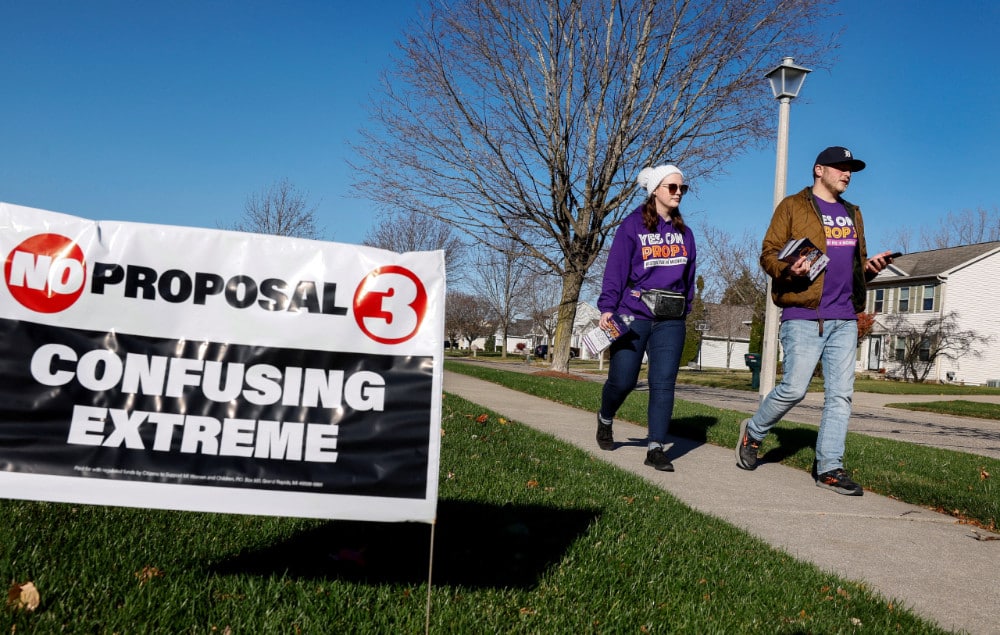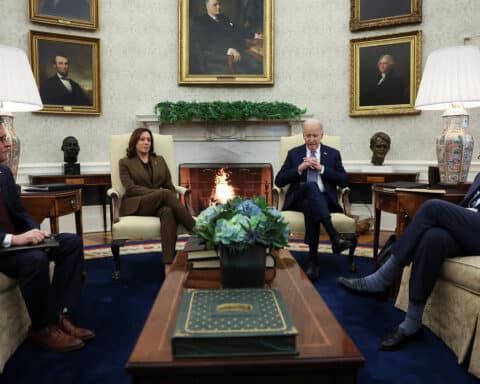WASHINGTON (OSV News) — Across the U.S. Nov. 8, voters in states with ballot measures concerning abortion both rejected moves to restrict the procedure and voted to codify it, in spite of Catholic efforts to protect the right to life for unborn children.
The state measures were the first nationwide test for the pro-life movement at the ballot box following the U.S. Supreme Court’s Dobbs v. Jackson Women’s Health Organization decision in June that overturned prior rulings guaranteeing abortion access as a constitutional right.
“The biggest concern that we have in the pro-life movement is that that we gain our advantage that we find through candidates debating the issue, where we don’t have that advantage when we’re outspent ten-to-one on a referendum,” Marjorie Dannenfelser, president of the D.C.-based Susan B. Anthony Pro-Life America, told reporters on a Nov. 9 press call, addressing the midterm results.
Susan B. Anthony Pro-Life America — formerly Susan B. Anthony List — is a secular organization that supports pro-life political candidates.
Dannenfelser downplayed the ballot measure losses, praising candidates who adopted a pro-life platform, including some of the Republicans her group endorsed for their victories such as Ohio’s Republican Senate nominee J.D. Vance, who defeated his Democratic rival Rep. Tim Ryan (Ohio).
“So the value of an advocate during a campaign can’t be underrated, and that’s why we’re so focused on the presidential race moving ahead and will be again involved in Senate and congressional races,” she said.
In California, voters approved Prop. 1, a measure to enshrine abortion and contraception as a constitutional right, dealing a blow to the California Catholic Conference which had tried to galvanize Catholics in opposing the measure.
In a statement, the California Catholic Conference, the official public policy voice of the Catholic Church in that state, called the outcome of the Prop. 1 ballot measure “tremendously disappointing,” but said “there is still much to be proud of and thankful for.”
“Though the measure succeeded, the number of Californians who identify as pro-life has increased by almost ten percent since the campaign began,” it said. “In contrast, the number of Californians identifying as pro-choice has dropped seven percentage points, from 62% to 55%. We’ve shown that we can unite and be winsome in advocating against the extreme, expensive and unnecessary push for late-term abortion.”
In Vermont, voters approved 77% to 22.8% a ballot measure declaring a constitutional right to “reproductive autonomy.”
Voters in Michigan rejected the state’s abortion ban that had existed prior to Roe v. Wade, the 1973 U.S. Supreme Court decision legalizing abortion in all 50 states, by approving legislative language protecting the legality of abortion. The ban briefly went into effect after the Dobbs ruling until courts blocked its enforcement.
Michigan’s new language codifying abortion access is expected to take effect Dec. 23.
In a statement, Detroit Archbishop Allen H. Vigneron said the measure is a “grave assault on the dignity and sanctity of unborn, innocent human life.”
“We grieve for the many women who will continue to be harmed by abortion in our state. And most importantly, we grieve for the lives who will be lost because of this unjust and perverse law,” he said.
The archbishop called for a dedicated period of “penance, giving alms, praying, and fasting,” from Nov. 27 to Dec. 4.
However, voter rejection of pro-life measures was also seen in so-called “red states” where voters have trended more politically conservative.
In Montana, a referendum aimed at recognizing infants born alive at any gestational age as legal persons appeared headed for defeat.
Kentucky voters also did not approve adding an abortion ban to their state constitution. Kentucky’s Catholic bishops expressed “disappointment” at the result and acknowledged that some people who voted against the measure had “serious concerns” about its other ramifications. Some opponents of the measure argued it did not account for medical exceptions where the mother’s life was at risk.
They bishops urged the courts to not make public policy but leave lawmaking on abortion to the legislature.
“The defeat of Amendment 2 is cause for sadness, but also a call to redouble our efforts at ensuring that every Kentuckian has the support they need to thrive,” they stated. “We renew our commitment to work with legislators to pass laws that protect the unborn, support women and families, and respect human life and dignity in all stages of life.”
Kate Scanlon is a National Reporter for OSV News covering Washington.
Peter Jesserer Smith, National News Editor for OSV News, contributed to this story.





